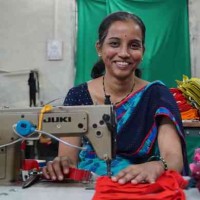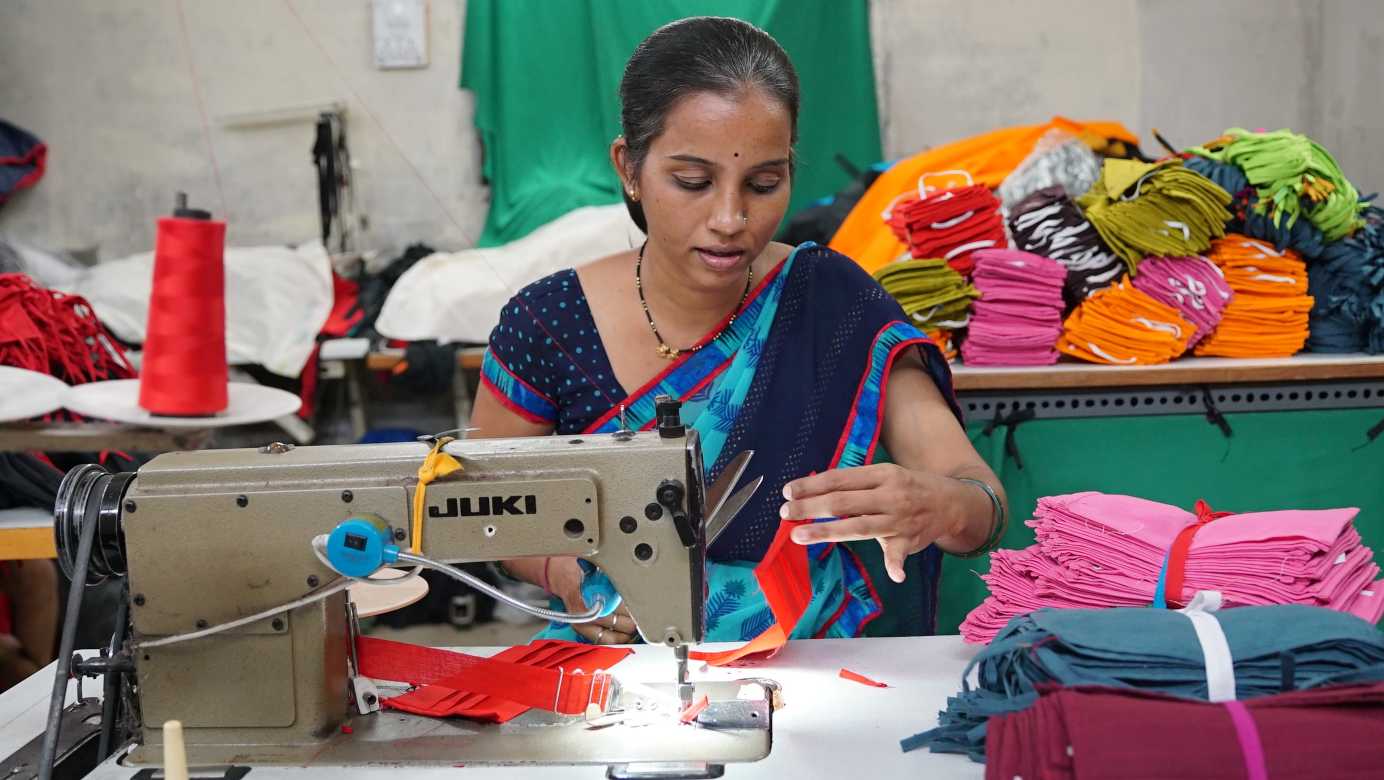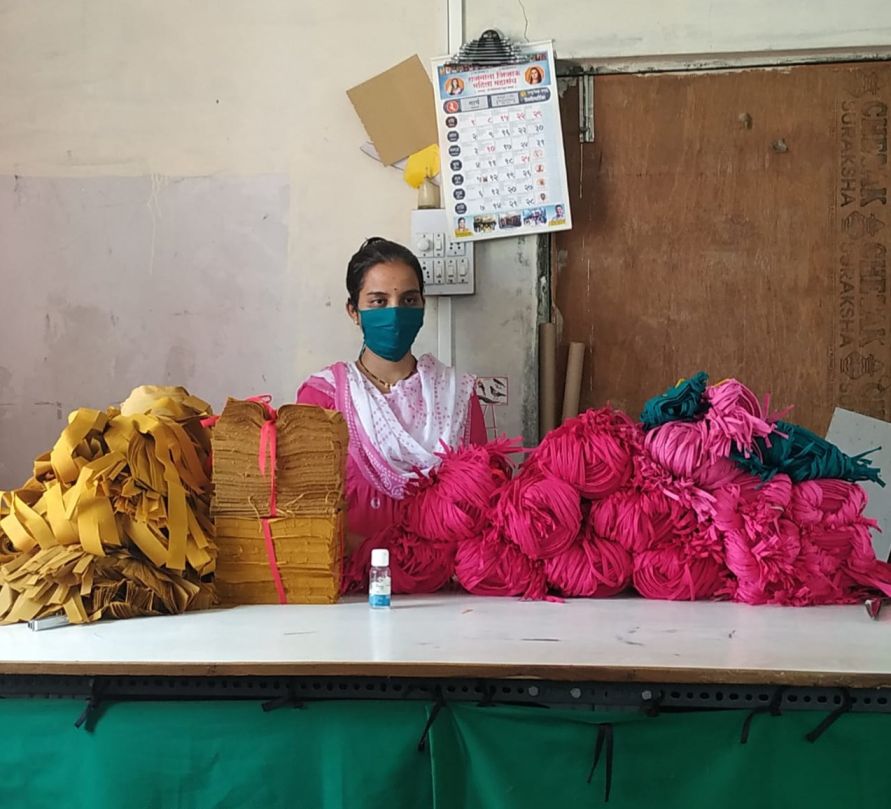A day in the life of a woman entrepreneur who is empowering many by making masks at home
Running a business is hard, but running a business during the lockdown is even harder. Roopali Pavnikar, a woman entrepreneur from Pune, Maharashtra, shows us how it is done

I live in Pune, Maharashtra, with my family which comprises my husband, two kids, in-laws, and brother-in-law. My husband and I run a T-shirt manufacturing enterprise that is located on the first floor of our house. We have ten machines which allow us to produce 3,000 T-shirts every month, and 7,000 uniforms and sports clothing pieces every year. With support from Mann Deshi—an organisation that I’m associated with—we used to sell these at exhibitions in Pune and in Mumbai, and we would also take orders from companies.
COVID-19 brought our business to a standstill. There was no way for us to sell the T-shirts because of the lockdown. Suddenly, we went from having a good business to having almost no income. So, I started using the material I had at home to make masks and started selling them on the road nearby for Rs 25 a piece. I did this for two weeks, until Anita tai (from Mann Deshi) contacted me.
She suggested that I use my T-shirt manufacturing machines to cut cloth and make and sell masks at scale, instead of the 10-12 pieces that I would sell every day. She put me in touch with some local women, and I started working with them to produce good-quality masks. Mann Deshi used word of mouth, referrals, and advertisements in local papers to find these women. When women responded, they would send them to work with me.

I started out with three women, but now I work with 30 women. Since I started this work one and a half months ago, we have sold more than one lakh masks!
The lockdown is on and because we have to maintain physical distancing, I don’t make the women come to my factory. Instead, they stitch the masks from their respective homes.
8.30 AM: I finish all my household chores and call Anita tai at the Mann Deshi office. She tells me the volume for the day—how many masks have to be cut and whether they are single-layer, double-layer, or triple-layer.
This forms the basis of all the work we do in the day. The Mann Deshi office is responsible for the marketing and distribution of all the masks we create. They sell to companies and government offices in Mumbai, organisations in Pune, and even to a few housing societies in the neighbourhood, who provide the masks to all the families in their buildings. They also supply me with the fabric to make the masks.
11.00 AM: The women who work with me start coming in to drop off the masks they have stitched. They also pick up the cut cloth for the next set that they will stitch at home. Everyone ensures that they are wearing masks when they come. I give them sanitiser when they come home, and I wear my mask and gloves while interacting with them.
In order to make sure that I can get my work done during the rest of the day, I have told them that they can only come between 11 AM and 1 PM. In case they are unable to move out of their homes, I take the cut fabric to their homes. I charge them 50 paise per mask to pay for my transport costs back and forth.
The women usually end up stitching around 100 masks every day; between the 30 women I employ, they are able to produce 3,000 masks every day. I check each of these for the quality of stitching and finishing.
Initially, we used to have many masks that were badly finished. The art of stitching and finishing in particular, is important, especially if they are double and triple-layer masks (since it involves arranging and aligning two and three different pieces perfectly before stitching). To teach them how to do this, I started sending videos (via WhatsApp) that showed the correct technique. This made a significant difference to the quality of their masks.

1.00 PM: I deposit the masks at the Mann Deshi office, which is just five minutes away from my house. They check and sort the products and transfer money to me online. I use this money to pay the women. Payment for the completed masks is made once a week—mostly via GooglePay and Paytm. In some cases, where the women don’t have smart phones, I pay them in cash when they come home to drop off the masks.
The women are paid Rs 5 per mask, and since they stitch around 100 masks daily, they earn Rs 500 per day. This is a significant earning, given that they have had no work or income since the lockdown began. These women used to previously work as cooks, domestic help, vegetable vendors, in beauty parlours, and in factories.
2.00 PM: After lunch, I sit down to stitch my own set of masks. Given that I spend all my time on my business, the burden of household chores and cooking is taken care of by the rest of the family. I stitch until around 8 PM. I manage to stitch around 50 masks.
9.00 PM: My husband and I start the machines to cut the cloth into masks. The machines run from 9 PM to 2 AM in the morning. The cutting requires skill and concentration. The fabric has to be aligned properly without any creases, else the masks will be cut incorrectly and will not be usable. This is also the reason we do it at night, when there are no distractions, and we can focus on this completely.
We are able to cut 5,000 pieces every night. Once cut, these are now ready to hand over to the women when they come the next morning.
Mann Deshi pays 75 paise per piece for cutting. In the last six weeks, my husband and I have cut around 90,000 pieces, and have earned Rs 67,500 in this time. This is in addition to the Rs 250 per day that I get for stitching 50 masks.
Usually, April-May is the time we would have received orders for school uniforms. However, given the uncertainty regarding when schools will re-open, this hasn’t happened. Also, even though we had paid for the school uniform fabric, the stock hasn’t come because of the lockdown. If we didn’t have this mask business, our financial situation would have been very bad at home.
When the school uniforms work starts, I will continue the mask business as well. Even though it will require me to work harder, I will continue to do both.
As told to IDR.
Roopali Pavnikar is an entrepreneur who runs a T-shirt manufacturing enterprise in Pune, Maharashtra. She is the recipient of the prestigious Mann Deshi Udyogini (business woman) Award and regularly mentors hundreds of aspiring entrepreneurs.
This article has been sourced from India Development Review. You can read the original article here.

